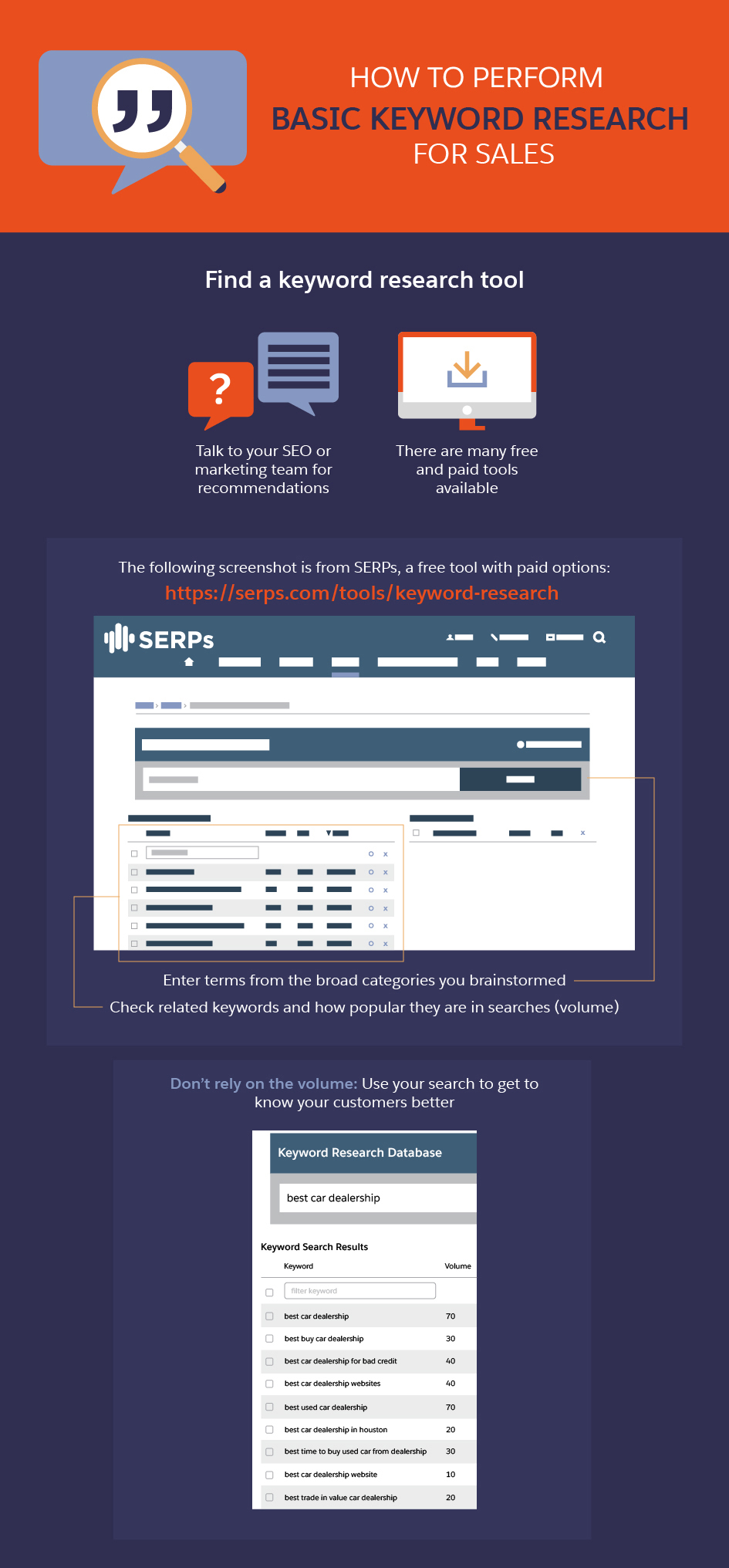Most sales professionals never feel the need to delve deeply into keyword research, preferring instead to leave keyword tools and website traffic analysis to search engine optimization (SEO) managers. It’s a shame, really, because, when performed correctly, keyword research can help provide crucial insights into all aspects of your business. After all, effective selling is all about knowing your product, knowing your customer, and knowing how to effectively communicate your value proposition. With effective keyword research, you can strengthen your knowledge, which in turn can increase your sales and leave you with happier customers.
More and more salespeople are discovering that keyword research isn’t just for increasing website hits and honing your marketing strategy. It’s a way to dive into your sales process from the customer’s perspective so you can use it to glean new ways to reach leads and close more deals.
The fundamentals of keyword research for sales professionals
There are plenty of in-depth resources that can teach you the ins and outs of keyword research, but it’s helpful to have a baseline understanding of the process. It’s pretty simple to get started: All you have to do is brainstorm a list of terms and topics that you think your customers are using in search queries.

Begin by coming up with a list of broad categories that people may use when searching for you, and then work toward a narrower list of keywords that fit in each category. For salespeople, one helpful strategy is to think about the topics that frequently come up in conversations with your customers. For instance, if you’re a cloud services company, your list may look something like this:
- Enterprise cloud computing
- Benefits of the cloud
- How can the cloud help my business
- Complete cloud solutions
- Cloud computing costs
If your company has a Google AdWords account (and it definitely should!), use it to determine which keywords are helping you rank well in search engines. Google’s Keyword Planner also lets you play around with the keywords you’ve come up with and see estimates of how they might affect your numbers.
Once you distill your list of relevant terms, you can research them on Google or Bing. Don’t forget to take notes on the effects of the various keyword searches on your company’s rankings, as well as that of your competitors.
Focus on the why, not just the what.
Throughout the sales process, the “what” questions often end up dominating our attention. Queries such as, “What do my customers like about my product?” and “What is the best way to close this deal?” become the focus when outlining a sales strategy. These questions are obviously crucial to the process, but it’s important not to lose sight of the “why”s that spur your customer’s decisions.
Keyword research is essentially a process of learning more about your customer’s pain points, which are the genesis of their “why” questions. You can have an encyclopedic knowledge of your product or service, and you may know the perfect time to engage your customer with pieces of information or content, but your sales process can still be improved with a deeper understanding of why your customer began this journey in the first place.
You can think of this in terms of non-business related conversations you have with your friends and family. When someone describes a problem they’re trying to solve, you put yourself in their shoes to better understand the situation and convey a sense of empathy. Humans instinctively respond positively to compassion, whether it’s during a sales call or a counseling session.

See your business from an outsider’s perspective.
Companies can quickly become insular environments. You’re working with a team of people to accomplish a shared goal in a unit with a well-defined culture and both written and unwritten standard operating procedures. Much of your waking life is spent gathering and analyzing information about your product or service. There are certainly times where this is beneficial! It’s helpful to be able to speak to your customers confidently about what you are trying to sell them, and your genuine enthusiasm is conveyed to them in myriad ways. But there are still many advantages to adopting an outsider’s perspective. In fact, that’s the entire reason why the consulting industry exists.
By doing some basic keyword research, you’re thinking about your company the way someone would if they had little or no familiarity with your brand. You can then use this information to determine if there are attributes of your product that are being ignored, which you can incorporate into your sales process in certain situations. You’ll be able to better relate to your potential customers as an outsider to the company.
Better understand your competitors.
No successful keyword research is complete without an investigation into how your competition ranks for various searches as well. Not only will this give you an insight into your competitors’ business models and specific strengths and weaknesses, but you’ll get a glimpse into your potential customer’s relationship with them as well.
Now, this doesn’t mean finding a competitor with a greater percentage of market share than you and just copying their sales strategy. After all, your company has its own unique value proposition that should be at the forefront of your efforts. But it is helpful to have a deeper understanding of what other companies can offer to your customer, and to be able to intelligently and confidently respond to their strengths in sales situations.
Stay connected to your customer’s purchasing journey.
The area where keyword research offers the most detailed and specific information is in your customer’s purchasing journey. It can show you what questions people are asking at each stage, from when they are looking for high-level information to when they are ready to pull the trigger. Once you know what stage of the funnel they are in when conducting their internet searches, you can use this information in conversations with them as well.
This is critical. Engaging with your customers appropriately based on their particular stage in the process can be the difference between signing a deal and watching them walk away empty-handed. It’s one of the most important skills for a sales professional to master, and it can result in you increasing your lead conversion rate. Learning which keywords are employed at various points in the process is the key to unlocking how you can best deploy the sales tools in your arsenal according to where the customer sits in their journey.

Build customer loyalty and encourage repeat purchases.
Keyword research has been integral in teaching marketers that SEO doesn’t stop at the point the sale is closed. There are still opportunities to engage the customer for service, support, brand building, upselling, and more, even after they’ve made the decision to purchase. Depending on your business model, these may be important to driving repeat purchases from your customers and building a loyal customer base.
It’s no secret that acquiring new customers is significantly more expensive than retaining existing ones, and that repeat customers spend more on average each time they purchase. Not only is it less expensive for the company to retain customers, it’s better for you as well. As salespeople, it’s clearly in your favour to develop long and mutually beneficial relationships with your clients. You’ll be better equipped to anticipate their needs and preferences, and they’ll be more likely to earn you a bigger commission. By successfully employing keyword research, you can learn what your customers are looking for after their purchase, and you can address these concerns with them during sales calls.
Research is the foundation of preparation
At the end of the day, the more prepared you are when you go into a sales situation, the more successful you’ll likely be. Much like intensely studying your product specifications and customer demographics, performing keyword research is one more way for you to use data and analysis to be better prepared.
It’s also important to remember that keyword research should be an ongoing part of your sales preparation strategy. As your business and your customers evolve, their specific pain points and journeys will change as well. It’s helpful to research your keywords at regular intervals to ensure that you are on top of what your customers need.
Customer decision matrices and purchasing journeys are becoming increasingly complex in the 21st century, and salespeople need all the help they can get in order to engage clients effectively. Keyword research isn’t a niche tool for marketing managers to increase hits on a landing page. Rather, along with your inherent knowledge and sales skills, it’s a way for you to better understand your business, your customers, and your competitors, and to use these insights to provide value for your customers and increase revenue.
Share “5 Ways Basic Keyword Research Will Help Boost Sales” On Your Site


























